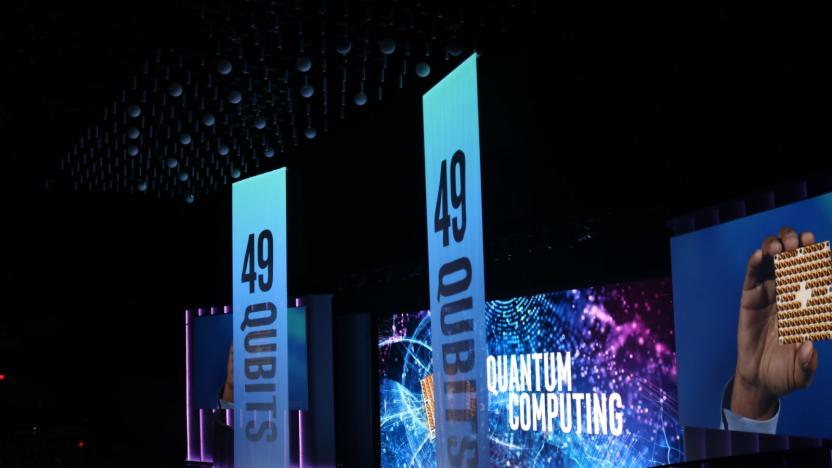superconducting
Latest

Intel’s quantum computing efforts take a major step forward
It's been almost three months since Intel announced a 17-qubit superconducting chip, meant to pave the way for a future powered by quantum computers. Today at CES, Intel CEO Brian Krzanich showed off its latest superconducting test chip, the 49-qubit Tangle Lake.

Physicists steer light on superconducting chips, forge our quantum computing future
We're still years away from quantum computing becoming an everyday reality, but the physics geniuses over at the University of California Santa Barbara have made a discovery that might speed that process along. A team under professor John Martinis' tutelage has developed a way to manipulate light on a superconducting chip at the quantum level, allowing the group to control the wave forms of released photons with a switch and a resonator. That might not seem like much, but it's ultimately a launching pad for much more. With photons now bowing to researchers' whims, the next step is to see if the particles can securely transfer data over long distances, such as between Earth and orbiting satellites, or just from one end of the world to another. It's a lofty goal to be sure, but nobody said the revolution would be over in a day.

Researchers wed quantum processor with quantum memory, quaziness ensues
Quantum computing has a long way to go before becoming truly mainstream, but that certainly hasn't stopped us from indulging in dreams of a qubit-based existence. The latest bit of fantasy fodder comes from the University of California, Santa Barbara, where researchers have become the first to combine a quantum processor with memory mechanisms on a single chip. To do this, Matteo Mariantoni and his team of scientists connected two qubits with a quantum bus and linked each of them to a memory element, capable of storing their current values in the same way that RAM stores data on conventional computers. These qubit-memory links also contained arrays of resonators -- jagged, yet easily controlled circuits that can store values for shorter periods of time. The qubits, meanwhile, were constructed using superconducting circuits, allowing the UCSB team to nestle their qubits even closer together, in accordance with the von Neumann architecture that governs most commercial computers. Once everything was in place, the researchers used their system to run complex algorithms and operations that could be eventually used to decode data encryption. The next step, of course, is to scale up the design, though Mariantoni says that shouldn't be too much of a problem, thanks to his system's resonators -- which, according to him, "represent the future of quantum computing with integrated circuits."

Novel Concepts' IsoSkin dissipates heat without the fan noise
Novel Concepts is probably just hopping on the "stop the overheating" bandwagon, but nevertheless, the firm's latest, um, novel idea is to eliminate those bulky, air-sucking PC fans by creating an ultrathin heat spreading material to coat toasty parts. Dubbed IsoSkin, the material comes in at just 500-microns thick, and the company insinuates that it could eventually be used to replace the "outer skin of portable electronics," further doing away with the need for internal heatsinks and fans. Notably, the sheets are purportedly able to "dissipate heat 20 times more effectively than copper," or transferring about 250-watts, while weighing in 60-percent lighter than the material it hopes to leapfrog. Utilizing planar capillary technology, the IsoSkins could reportedly be "manufactured for pennies per square centimeter," and considering that several microprocessor and electronics companies are already testing this stuff out, maybe the next wave of lappies won't require firefighter-grade pants to use safely.[Via ExtremeTech]



